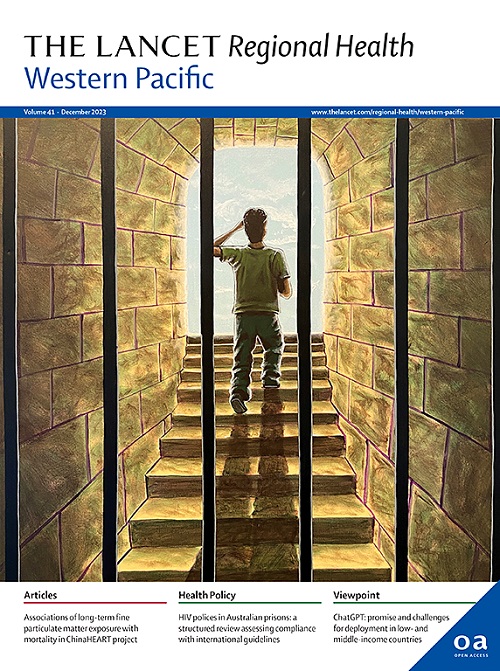Health and incarceration research in Australia: a scoping review
IF 7.6
1区 医学
Q1 HEALTH CARE SCIENCES & SERVICES
引用次数: 0
Abstract
Background
People who experience incarceration often have complex healthcare needs and poorer health than the general population. Australia has the eighth-largest custodial population in the Western Pacific. Understanding the breadth and quality of research on this population's health is crucial for advancing health equity both in Australia and across the region. This scoping review synthesised health research involving people in contact with the criminal justice system in Australia.
Methods
We searched eight databases for primary, peer-reviewed research reporting on the health of people incarcerated or previously incarcerated in Australian prisons or youth detention settings.
Findings
Our search identified 11,731 unique records, and 508 met the inclusion criteria. Over half (51%) were published between 2015 and 2024. Relatively few studies provided evidence on cognitive disabilities (16%), non-communicable diseases (14%), or sexual and reproductive health (6%). Few focused on youth detention (15%) or post-release health (24%). Only 27 studies (5%) focused exclusively on the health of First Nations Australians. Most studies (86%) came from Australia's most populous states—New South Wales, Queensland, and Victoria—which account for 68% of people incarcerated each year, and 58% of incarcerated First Nations peoples.
Interpretation
Despite considerable growth in the number of peer-reviewed studies on the health of people who experience incarceration, critical health issues, key populations, and Australian jurisdictions with the highest incarceration rates require urgent attention. Further high-quality research is needed to fill these evidence gaps and translate research into evidence-based strategies that address the complex and diverse health needs of justice-involved people.
Funding
SP was supported by a Australian Government Research Training Program Scholarship.
澳大利亚的健康和监禁研究:范围审查
经历过监禁的人往往有复杂的医疗保健需求,健康状况比一般人差。澳大利亚是西太平洋地区第八大被监禁动物的国家。了解这一人群健康研究的广度和质量对于促进澳大利亚和整个地区的健康公平至关重要。这项范围审查综合了涉及与澳大利亚刑事司法系统接触的人的健康研究。方法:我们检索了8个数据库,检索了有关澳大利亚监狱或青少年拘留所在押人员或曾在押人员健康状况的初级同行评议研究报告。findsour搜索确定了11,731条唯一记录,其中508条符合纳入标准。超过一半(51%)的论文发表于2015年至2024年之间。相对较少的研究提供了关于认知障碍(16%)、非传染性疾病(14%)或性健康和生殖健康(6%)的证据。很少有人关注青少年拘留(15%)或释放后健康(24%)。只有27项研究(5%)专门关注土著澳大利亚人的健康。大多数研究(86%)来自澳大利亚人口最多的州——新南威尔士州、昆士兰州和维多利亚州,这些州占每年被监禁人数的68%,占被监禁的原住民的58%。尽管关于被监禁者健康的同行评议研究数量有相当大的增长,但关键健康问题、关键人群和澳大利亚监禁率最高的司法管辖区需要紧急关注。需要进一步开展高质量的研究,以填补这些证据空白,并将研究转化为以证据为基础的战略,以解决与司法有关的人复杂和多样化的健康需求。资助项目由澳大利亚政府研究培训计划奖学金资助。
本文章由计算机程序翻译,如有差异,请以英文原文为准。
求助全文
约1分钟内获得全文
求助全文
来源期刊

The Lancet Regional Health: Western Pacific
Medicine-Pediatrics, Perinatology and Child Health
CiteScore
8.80
自引率
2.80%
发文量
305
审稿时长
11 weeks
期刊介绍:
The Lancet Regional Health – Western Pacific, a gold open access journal, is an integral part of The Lancet's global initiative advocating for healthcare quality and access worldwide. It aims to advance clinical practice and health policy in the Western Pacific region, contributing to enhanced health outcomes. The journal publishes high-quality original research shedding light on clinical practice and health policy in the region. It also includes reviews, commentaries, and opinion pieces covering diverse regional health topics, such as infectious diseases, non-communicable diseases, child and adolescent health, maternal and reproductive health, aging health, mental health, the health workforce and systems, and health policy.
 求助内容:
求助内容: 应助结果提醒方式:
应助结果提醒方式:


